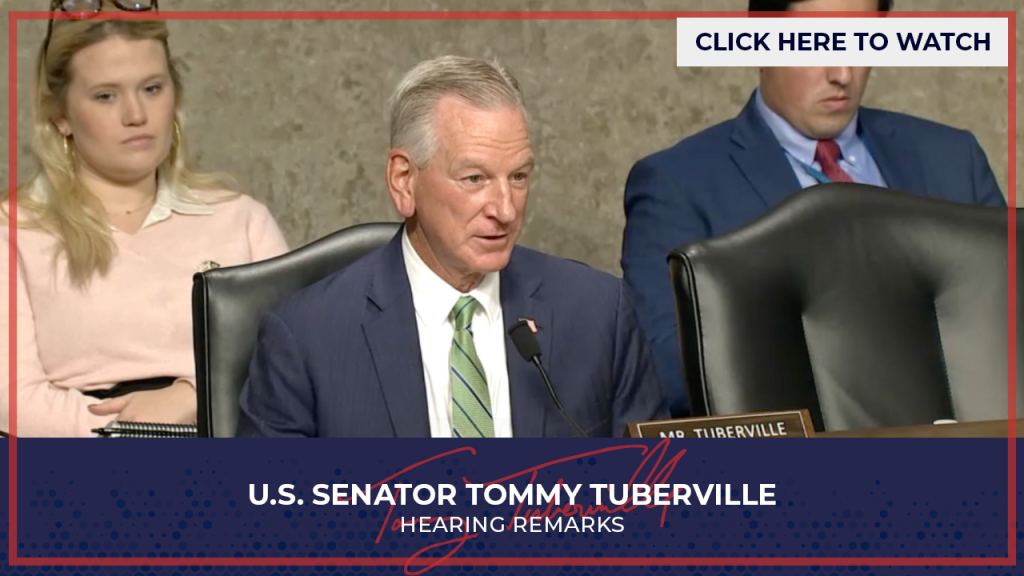WASHINGTON – Yesterday, U.S. Senator Tommy Tuberville (R-AL) spoke with Cheryl Mason, Inspector General at U.S. Department of Veterans Affairs (VA), Ryan Gallucci, Executive Director at Veterans of Foreign Wars, and Dr. Daniel Gade, Lt. Col. in the U.S. Army, during a Senate Committee on Veterans’ Affairs (SVAC) hearing. They identified problems in the current VA system that are in the way of veterans receiving the disability benefits they deserve.
Read Sen. Tuberville’s remarks below or on YouTube or Rumble.

TUBERVILLE: “Thank you for your passion. This is a great panel. Thanks for doing this. We spend a lot of time doing things to help our veterans. I come from military family and been very passionate to me. ‘Right benefits for the right veterans.’ I think that’s what our […] title is here today. I’d like for anybody to answer this, I don’t know who to ask this question to. But many will remember that under the Veterans Access Choice and Accountability Act of 2014, a commission on care was established to develop recommendations to improve the VHA. The call for this commission came after a handle at the VHA.
Don’t each of you think that it’s time for a commission that was established to develop recommendation to improve the VBA and don’t our veterans deserve a system like this with a commission? Anybody wanna answer this? Push your button and have at it.”
MASON: “Okay, I guess I’m gonna jump in.”
TUBERVILLE: “You’re first. Go ahead.”
MASON: “Yes, I think your commission would be very, very well placed. I think it is needed to look at the VBA process like it’s supposed to do at VHA.”
TUBERVILLE: “Anybody else? Go ahead, Ryan.”
GALLUCCI: “Thank you, Senator. I get nervous about the prospect of the commission, and there’s a reason why.”
TUBERVILLE: “Well, we all do.”
GALLUCCI: “I remember with the care commission. We, as an organization, were a bit of champions of that. And it couldn’t make it past the first marker. You know, and now we’re seeing the repercussions of that. I know we’re talking about the benefits administration, but now with Veterans Health Administration, it’s become glaringly obvious that the infrastructure is in the wrong place, and it’s resulted in a higher cost for care.
I would argue that a forum like this is certainly a good start to have these discussions. I think they’re, you know, I know that […] Dr. Gade and I don’t agree on everything, but there are a few things that he said that I know […] we would agree on. As far as how we reform the system and incentivizing the right behavior by veterans who are only seeking the benefits that they’ve earned through their service contract.”
TUBERVILLE: “Thank you.
You know, with the passage and fast-tracked information of the PACT Act, it has put a strain on [the] disability claim processes. How can we simplify that? How can we make sure they both work? A lot of money has been put into this. Anybody?”
GADE: “Senator, I’d like to I’d like to just briefly point out that there are several things in the PACT Act that are not only problematic from a sort of overloading the system point of view, but also problematic from a from a moral point of view. So, here’s an example. The PACT Act makes hypertension presumptive condition for all Vietnam veterans who are exposed to Agent Orange. What is not mentioned in the PACT Act or any of the discussion around that is that when your norm for age, sex, and race, non-veterans of those age groups have the same exact hypertension rates as veterans do in those age groups. So, we’re compensating for something that is—forgive the expression—but old fat people get hypertension.
That’s going to happen to, you know, sort of all of us at some point. But what the PACT Act did was [it] allowed people to shift their responsibility for those lifestyle conditions from themselves to the government and blame the government for problems that are not the fault of the government, and therefore, taxpayers are taking a bath on that.”
TUBERVILLE: “Thank you. So, anybody what simple changes do we need to make to make sure disability claims go to the right people? Go ahead, Ryan.”
GALLUCCI: “Senator, I would say that we need to speed up the science I think the issue that we see, for example, with Karshi-Khanabad, in Uzbekistan, there was a stark difference between what service members who developed rare cancers and rare healthcare conditions while they were still on active duty, gaining those benefits and then those who [when] the uniform came off, but the condition didn’t develop till 15 months after they came off of active duty and they’ve been struggling ever since. I think one of the greatest detriments that we have is the time it takes to identify when a toxic exposure has happened and then make that veteran whole. I think because of the frameworks set forth in the PACT Act, there needs to be some urgency, especially for people like those who served on K-2.”
TUBERVILLE: “Urgency doesn’t work up here in federal government. I’ll tell you that. We wish it did. Thank you, Mr. Chairman. My time’s up.”
Senator Tommy Tuberville represents Alabama in the United States Senate and is a member of the Senate Armed Services, Agriculture, Veterans’ Affairs, HELP and Aging Committees.
###